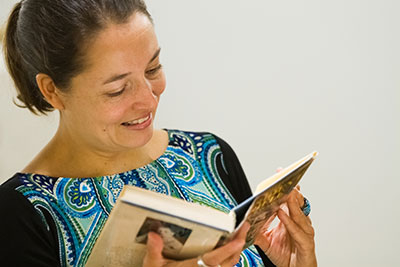
“I feel extremely fortunate and honored to be able to not only gain access to a language lost to me because of colonization, but to collaborate with Indigenous language teachers on creating new materials that will benefit Dakota people for generations to come,” said Vigil. “In addition, I am eager to include Amherst students as partners in this project as I build a website that will be a resource for both historians and the general public interested in learning more about Dakota contributions to United States history and culture.”
“We are delighted by the news of Professor Vigil’s award,” said Amherst Provost and Dean of the Faculty Catherine Epstein. “She was hired by the College’s Department of American Studies to co-create a rigorous NAIS curriculum and help to reimagine the American Studies major, and she has done just that during her time at Amherst while becoming an innovative and much-loved teacher and one of the foremost experts in her field active today. Her project will undoubtedly help her make an important contribution to ongoing efforts to preserve Dakota language, culture and history for future generations.”
Through the fellowship, Vigil will take intensive Dakota language lessons and courses in linguistic anthropology through the University of Minnesota. She will use her newfound skills and knowledge to translate items in the KWE Collection, including a Bible, dictionaries and issues of a rare American Indian newspaper, Iapi Oaye: The Word Carrier. (Published in the Santee dialect of Dakota—now a critically endangered language—Iapi Oaye ran from 1871 to 1939, far longer than any other native-language newspaper in the U.S., and covered significant historical events, such as the 1890 massacre at Wounded Knee.)
“In college I studied three romance languages, becoming fluent in two and acquiring translation skills in the third. But I was unable to access my people’s language,” said Vigil, who has ancestors from both the Dakota and Apache Tribes. “I want to approach my own history anew by looking for nuance and complexity encoded in the Dakota language. The New Directions award will make that endeavor possible.”
Vigil also plans to practice speaking Dakota with elders and other members of the Oyate (which translates as “Nation and the People” in Dakota) via the online language group: Dakhóta iápi Okhódakičhiye (DIO). She will then create an interactive storytelling website on the open-source platform Twine, which is popular among Indigenous video game developers and artists, “to ameliorate the ever-present threat to language loss.” The site will provide new translations of Amherst’s materials concerning Dakota history, culture and thought while also offering historical reflections informed by new training in linguistic anthropology.
“A website can function as a gathering site to renew kinship connections,” Vigil said. “For reasons of cost and safety at this moment, it is also the best way to practice a language that may be familiar or learn one that is still unknown.”

A group of college professors, librarians and graduate student taking a deep dive into the Kim-Wait/Eisenberg Native American Literature Collection in Amherst’s Archives and Special Collections.
She said that when she returns to teaching at Amherst, she will do so with a new set of perspectives on Native American studies that will help her create innovative courses for Amherst undergraduates and unlock new areas of research for students and scholars.
“Although this is a ‘new direction’ in terms of language learning and training in linguistic anthropology, it is ultimately a chance for me to reconnect and return to people, events, and ideas that were integral to my ancestors’ experiences of life in the United States,” Vigil explained. “Though my ancestors and I have remained at a distance, separated because of time and space and also language and culture, my work at Amherst has brought me into the same orbit as a unique set of Dakota-only texts that have a new home in the College’s archives. Now, more than ever, I am compelled to interpret and understand these materials for what they can teach me and others about Dakota life, past, present, and future.”
The New Directions program, which has awarded fellowships since 2002, supports faculty members in the humanities and humanistic social sciences in acquiring training and skills outside their own areas of special interest to work on problems that interest them most. Recent Amherst recipients of the award include Laure Katsaros, professor of French, in 2014, and Edward Melillo, professor of history and environmental studies, in 2017.